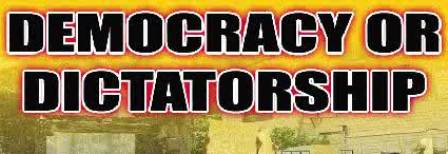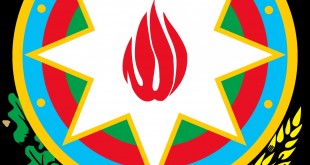
The subtle line between what it is and what it should be
We accept all “good and new” things from West and they are directly trying to be applied all over the world as benchmark. All seek to implement them without trying to personalize. It is undeniable that people see the positive results of these “good and new” things, but they do not understand that this “new” thing was born with specific population, within specific territory, civilization and time. They do not understand that even if it is possible to apply this “new” thing somewhere it must and will take time. One of such “good and new” things is democracy. This article will focus on the nondemocratic regimes which are considered as the opposite to democratic ones. Nondemocratic regimes are those controlled by a small group of individuals who exercise power over the state without being constitutionally responsible to the public. Nondemocratic regimes are considered as the regimes which deny the most important features of democracy: participation in governance, liberty and competition.
The article “Islam and authoritarianism” by Steven Fish proves that, Muslim countries are less democratic than others. The author uses Freedom House score as the indicator of political liberty and analyzes different variables in order find their correlation with democracy. His main focus is on Islam. After finding big connection between democracy and Islam, he tries to determine reason why Islam leads to nondemocratic regime. Although he acknowledges endogeneity between Islam and women station, his findings show that female station matters. I agree with all these results, because this study could not be proved quantitatively better than it. But the name of the article should be Manipulation of Islam in the state level, or its misinterpretation by people and authoritarianism. When Islam is used as political tool by the government it can lead to nondemocratic regime. In this case I can compare 2 countries: Turkey and Azerbaijan. Turkey is constitutionally secular state but Islam is used in state level as soft power which is obviously seen in the current polity of the Justice and Development party. Azerbaijan is also constitutionally secular state, 95% people are Muslims but the religion does not cover political sphere. Turkey is partly free on internet, not free in media and overall Turkey is partly free (Freedom House, 2013). The result shows that Azerbaijan is partly free in internet, not free in media and overall result shows that Azerbaijan is not free country (Freedom House, 2013). Thus these 2 Islamic countries have the similar democracy result but its coverage of the political field differs. Not Islam itself, its usage in the state level can lead to authoritarianism. In Azerbaijan the reasons of nondemocratic regime are different and far from Islam which will be mentioned then. Although North Korea and former Soviet Union are not Islamic countries they are still great examples to nondemocratic states.
Actually at the end the author compares a few requirements of holy Koran with real practice and admits that the real text is different but people interpret it variously and these interpretations determine the practice. The name of article is too much for this islamaphobic era that we live in, because from the start it creates antipathy against Islam and Muslims. This statement is biased and can form other misinterpretation in people that Islam creates authoritarianism which is alike Muslim equals to terrorist.
“Does oil hinder democracy?” by Michael Ross aims to prove the validity of the claim that oil impedes democracy. Firstly, he wants to determine whether this statement is only true for Mideast countries or not. Second dimension is: Does only oil have such properties that impede democracy or other resources also have? He uses 3 possible explanations to test- ”rentier effect” which suggests that resource rich governments use low tax rates, ”repression effect” and ”modernization effect”.
Ross analyses “taxation and group formation effect” as parts of “rentier effect”. “Taxation effect” means that as the countries derive great part of revenue from oil they become to tax population less, so people get to demand less representation in government. “Group formation effect” means that governments which mostly earn revenues via oil they tend to prevent people to create independent civil organizations which can demand their political rights and contribute to democratization. Through different tests Ross claims that oil impedes democracy statement is valid and does not only belong to Middle East countries. He also finds that not only oil, other nonfuel mineral sources can impede democratization.
Azerbaijan is one of the biggest oil exporters and “rentier effect” is applicable here and its main reason is self-financing of the government without any need to taxation from people therefore polity does not let people participate in governance. Oil can be the reason for nondemocratic regime but it is not the only reason in my country. One institution of democracy is local administration which is implemented by municipalities in Azerbaijan and was formed in 1999 actually as the requirement for entering the Council of Europe. Therefore though this unit was created 16 years ago, now it does not act as in Europe or in Turkey. Because it was not formed as the result of natural process, the need of people. As the impact of former Soviet Union majority of our people wait order, solutions from above, they are unwilling to participate in governance. They do not know their rights-what they can do themselves not depending on center, via municipalities.
Another simple example: In our universities attendance is obligatory which is different from democratic European countries. But if it was flexible in Azerbaijan the vast majority of students would not go to universities regularly, because they do not understand that they need attend and take part in teaching process directly. So I consider that democracy does not arise suddenly, it takes time. Suppose that one polity is authoritarian and via revolution during the night it changed and new polity is so democratic but it does not mean that from now on this state will be democratic. It may create shock effect on people, even can lead to anarchy. So educational, outlook, development level of people should allow and create democracy itself.
Also we can not judge authoritarianism somewhere without knowing its history, population. Authoritarianism is acceptable till it turns to totalitarianism. Democracy is not something that is given people from above-the central government, in contrast as the population is developing, they must feel need for democracy, they must think that they are eventually ready for participation in ruling, then democracy will arise gradually in evolutionary way.
Thus we derive these results: 1. Islamic countries are tend to be more authoritarian than others. 2. Mineral resources including oil hinder democracy. To some extent these carefully proved results are acceptable. But regardless their similarities each country is unique and has specific features. So getting exact results after finding general ones we must examine them individually: history, population, tradition etc. Not separate reasons, their combination creates result. Also we should not forget that application of “new and good” things can take time. Because we must not forget that these things have not formed suddenly, West has not been living with them since the creation of Earth. Finally if something happens here and better happens there, it does not mean that immediately the better one should be applied here. May be this something is the best option in that context. Thus sometimes what it is really can coincide with what it should be.
BY: LEYLA ABBASLI
Bibliography
Fish, S. (2002). Islam and authoritarianism. World Politics, 4-37.
Freedom House. (2013). Retrieved from https://freedomhouse.org/country/turkey
Freedom House. (2013). Retrieved from https://freedomhouse.org/country/azerbaijan
Ross, M. (2001). Does oil hinder democracy? World Politics, 325-361.
 Oval Useful news from Azerbaijan and Caucasus
Oval Useful news from Azerbaijan and Caucasus
